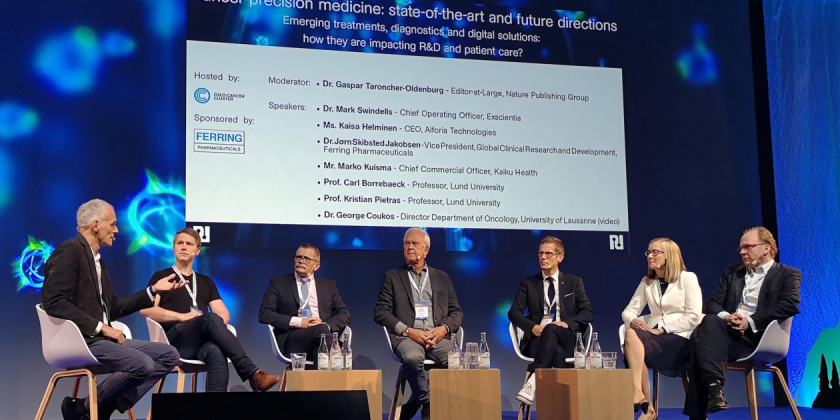Forward-looking session on cancer precision medicine
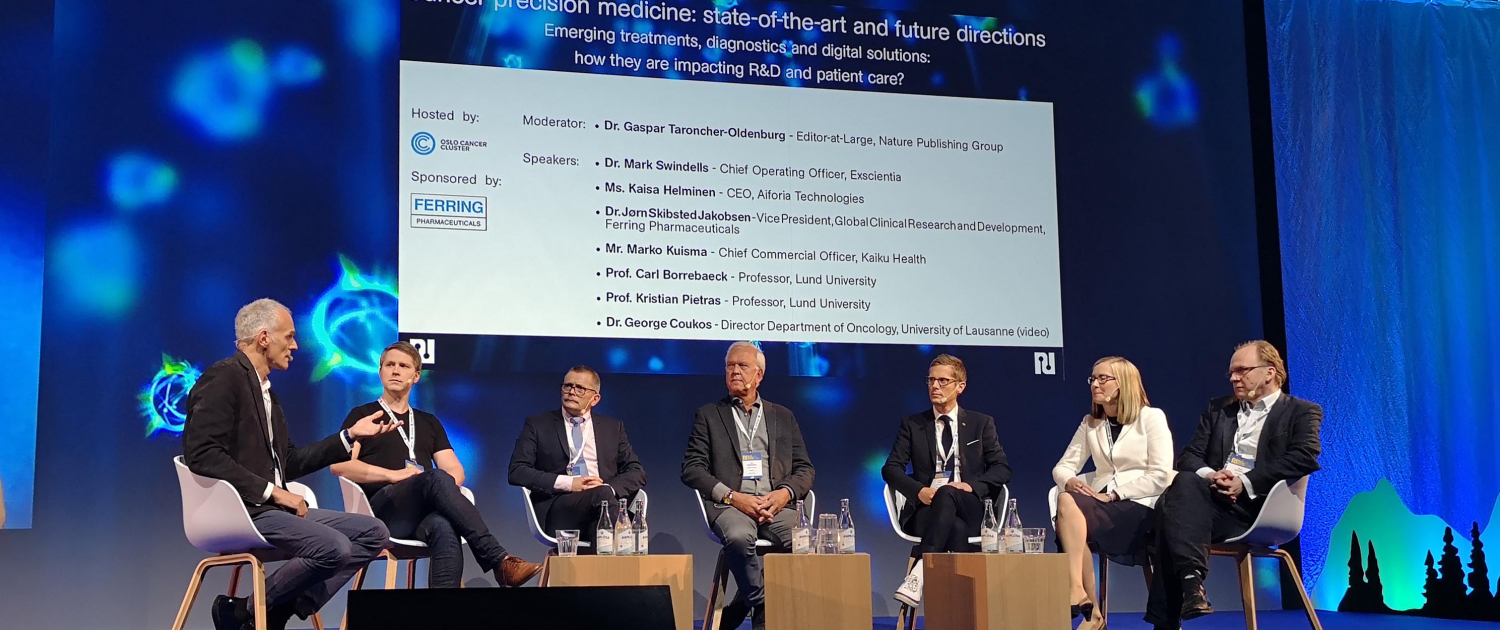
Emerging therapies, digital solutions and AI were central topics when international experts met during the oncology session at the Nordic Life Science Days 2019.
Oslo Cancer Cluster hosted the session on oncology titled “Cancer precision medicine: State-of-the-art and future directions” at the Nordic Life Science Days this year. The session covered recent advances in cancer immunotherapy and cell- and gene therapies. International experts met to discuss how big data, artificial intelligence and digital solutions are changing drug development, diagnostics and patient care.
AI revolutionizing cancer research
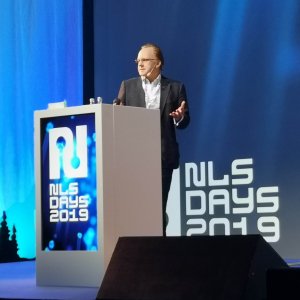
Mark Swindells on artificial intelligence and drug discovery.
Mark Swindells, PhD, COO Exscientia, presented how artificial intelligence is changing and driving drug discovery now.
“On average 2 500 compounds need to be synthesized and tested to develop a candidate molecule for clinical trials. We want to apply AI to this artisan area of drug discovery. By reducing the amount of compounds synthesized and tested, we will reduce the overall cost and time to get drugs to market,” Swindells said.
This is a fast moving area and one of the examples of technical innovation Swindells gave was Exscientia’s Active Learning algorithms, which have been benchmarked to work as well as – and in some cases better than – the most successful humans.
In the area of precision oncology, Swindells said: “We are particularly interested in the acquisition of resistance in oncology as an area where our technology could be applied.”
Kaisa Helminen, CEO Aiforia, focussed on how the use of artificial intelligence can make image analysis more accurate and efficient.
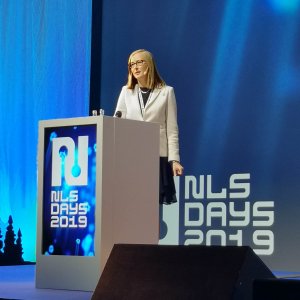
Kaisa Helminen on artificial intelligence and image analysis.
“Due to the ageing population, more samples need to be analysed and many countries suffer from serious shortage of pathologists. Many patients are left waiting for their diagnosis and treatment. Manual, visual image analysis is slow and highly subjective. There is a risk for misdiagnosis, which can be dramatic for the patient and costly for the healthcare system.”
Aiforia has built an AI platform that supports medical experts in diagnostics.
“For the first time we are bringing AI tools for doctors’ use, so they can easily create their own AI algorithms,” Helminen explained. “Instead of visually estimating something from samples, we bring accurate, numerical information. AI algorithms are consistent from day to day, week to week, removing the human error component,”
We are bringing AI tools for doctors’ use.
Marko Kuisma, Chief Commercial Officer at Kaiku Health, then presented a new digital platform for better patient monitoring, using machine learning tools.
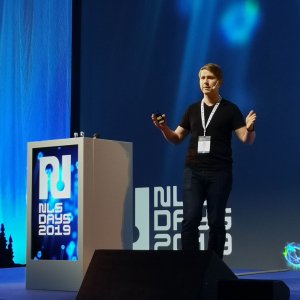
Marko Kuisma on digital tools for better patient monitoring.
Scientific evidence demonstrates that patients who use a digital symptom monitoring solution have an overall survival benefit, experience improved quality of life and go through less visits to the emergency room and hospitalisations.
“The traditional interventions that clinicians make are reactive and come with a delay,” Kuisma explained. “With digital symptom monitoring, interventions are still reactive, but more timely, because you can detect the symptoms early on. When applying machine learning, we make that monitoring proactive and predictive, taking action before symptoms and adverse effects develop.”
“… taking action before symptoms and adverse effects develop.”
Identifying gene mutations
Jørn Skibsted Jakobsen Md. Ph.D.,Vice president Science and Medicine TA Urology/Uro-Oncology, Global Clinical Research and Development, Ferring Pharmaceuticals, introduced emerging gene therapies to treat non muscle invasive bladder cancer (NMIBC) bladder cancer.
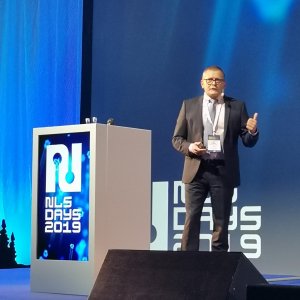
Jørn Skibsted Jakobsen on a radical new gene therapy.
If a NMIBIC patient doesn’t respond to BCG (a type of immunotherapy drug), a cystectomy is still considered the gold standard treatment. This involves surgically removing all or parts of the urinary bladder, creation of a urinary diversion using a piece of the small intestine and leads to a significantly decreased quality of life for the patient.
Jakobsen introduced a new gene therapy to treat NMIBC patients that are unresponsive to BCG treatment.
“Early research suggests mutations in the surrounding tissue of the tumour potentially predict the subsequent recurrence of the disease,” Jakobsen said. “What if we were able to identify those mutations? And then create a personalised gene-based antibody directed at identified mutations. You could potentially treat patients before the recurring disease.”
“You could potentially treat patients before the recurring disease …”
Novel targets and pathways
Carl Borrebaeck, Professor, Lund University, and Kristian Pietras, Professor of Molecular Medicine, Lund University presented L2CancerBridge, a collaboration between the Swiss Centre of Lausanne and Lund University. They are exploring a new model for translational research in breast cancer and tumour immunology.
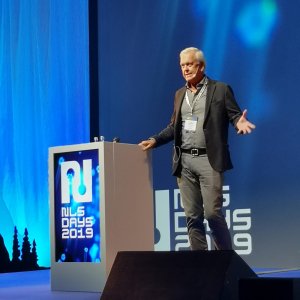
Carl Borrebaeck introduced L2CancerBridge.
The tumor immunology team in Lausanne is focused on identifying novel targets on immunoregulatory cells as T cells and dendritic cells, with the goal of identifying new targets for CAR-T cells. The breast cancer team is focused on studies of tumour cells and their microenvironment with the goal to identify signalling pathways.
“We have been able to find signalling pathways between malignant cells and connective tissue,” Pietras said.
These pathways are crucial for basal-like breast cancer, the most aggressive breast cancer subtype, and block the development of resistance to endocrine therapy. Blocking them allows the use of effective endocrine therapies in cancers that previously did not have any targeted treatment options.
Gaspar Taroncher-Oldenburg, PhD; Editor-at-Large, Nature Publishing Group, moderated the session for the second year in a row.
“I have been impressed by how much thought both co-hosts of the event—Jutta Heix from the Oslo Cancer Cluster and Carl Borrebaeck from Lund University—put into weaving together a compelling story that is timely and relevant, both locally and globally.” Taroncher-Oldenburg said.
“Of course, much of the credit for the session being successful goes to the panelists, who again this year captured the audience’s attention through a combination of intriguing presentations and a dynamic roundtable discussion that broadly illustrated different aspects–present and future—of precision medicine in oncology.”
“A compelling story that is timely and relevant, both locally and globally.”

